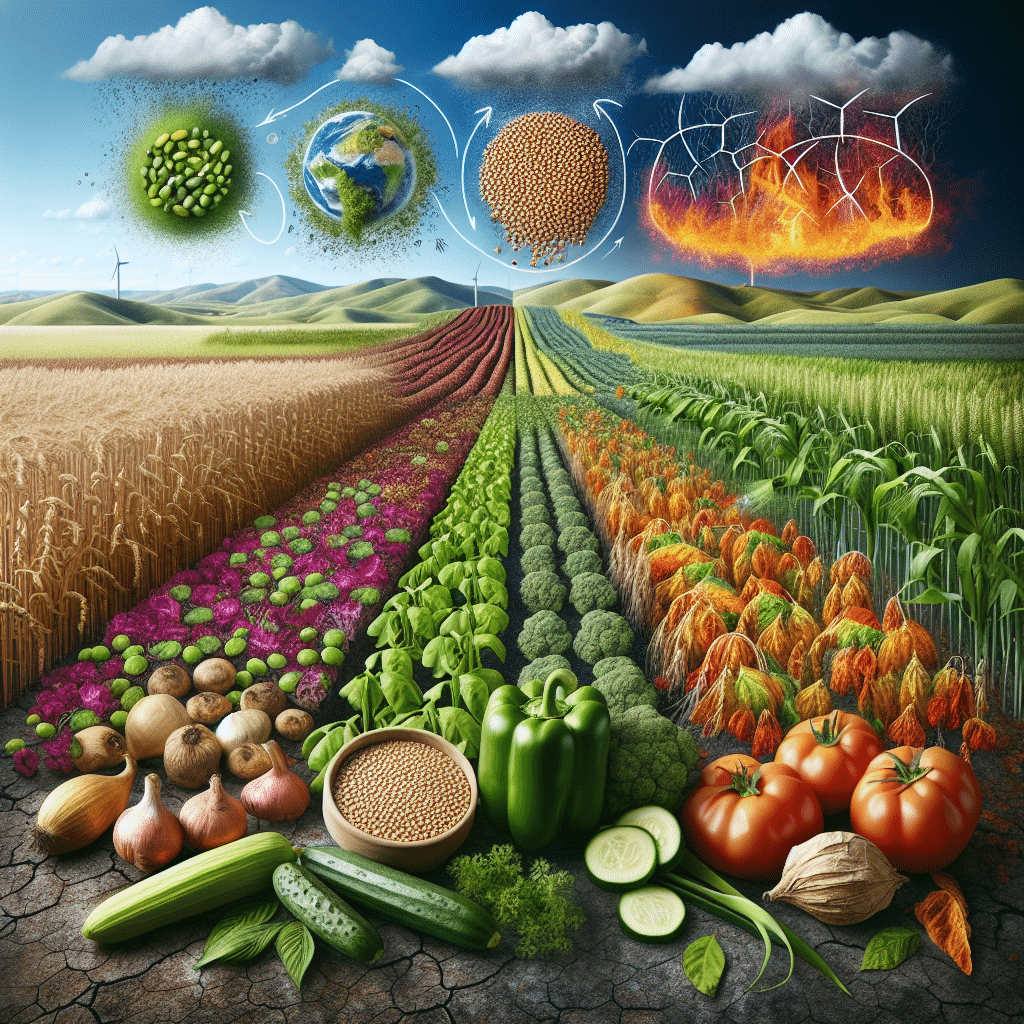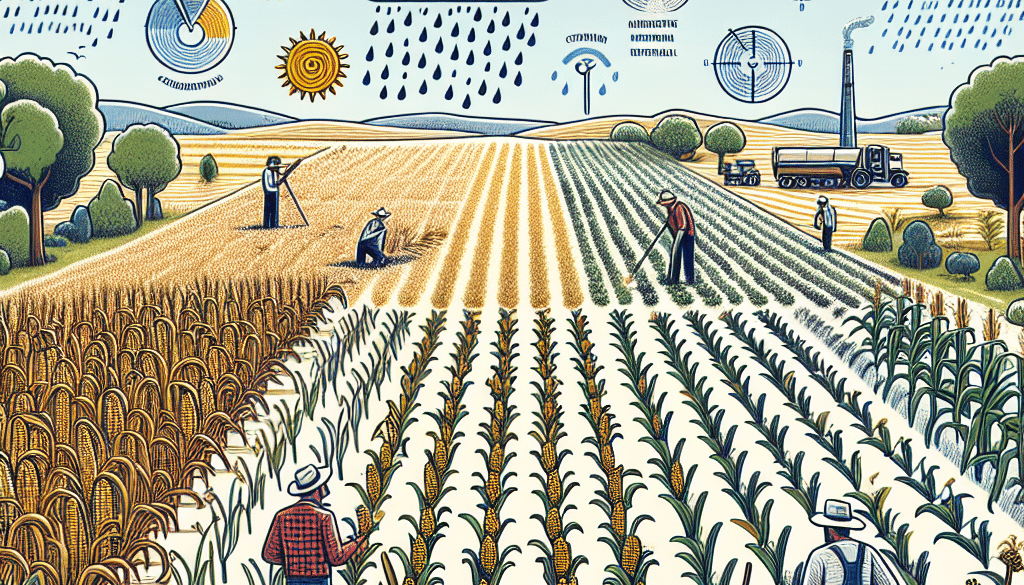Climate Change Can Make Crops Less Nutritious
-
Table of Contents
Climate Change and Its Impact on Crop Nutrition

Climate change is not just a threat to our weather systems and global temperatures; it also poses a significant risk to global food security and nutrition. The increasing levels of carbon dioxide (CO2), rising temperatures, and altered precipitation patterns are not only affecting the quantity of food we can grow but also the quality and nutritional value of these crops. This article delves into the concerning trend of declining crop nutrition due to climate change and explores the implications for global health.
The Nutritional Quality of Crops Under Climate Stress
As the planet warms, the nutritional content of our food is changing. Research has shown that elevated CO2 levels can lower the concentrations of essential nutrients in crops such as zinc, iron, and protein. This phenomenon could have severe consequences for the nutritional status of populations around the world, particularly in regions where diet-related deficiencies are already a concern.
- Reduction in Protein Content: Studies indicate that higher CO2 levels can lead to a significant decrease in the protein content of staple crops like rice, wheat, and barley.
- Decrease in Mineral Nutrients: Essential minerals such as zinc and iron are also at risk. These minerals are crucial for immune function, cognitive development, and overall health.
- Impact on Vitamin Levels: There is also evidence to suggest that some vitamins, such as B vitamins, may be affected by climate change, further compromising the nutritional value of crops.
Case Studies and Evidence
Several studies have highlighted the impact of climate change on crop nutrition. For instance, a study published in the journal ‘Nature’ found that elevated CO2 levels led to significant reductions in zinc, iron, and protein in wheat and rice. Another study by the Harvard T.H. Chan School of Public Health projected that by 2050, 175 million people could become zinc deficient and 122 million people could become protein deficient due to CO2-induced reductions in crop nutrition.
Global Health Implications
The decline in crop nutrition could exacerbate existing health problems, particularly in developing countries where diets are heavily reliant on staple crops. Malnutrition, stunting, and diet-related diseases could see a rise, undermining decades of progress in public health.
- Increased Malnutrition: With crops becoming less nutritious, populations may face increased rates of malnutrition, particularly in children and pregnant women.
- Exacerbation of Deficiencies: Deficiencies in zinc, iron, and protein can lead to a range of health issues, including impaired immune function, anemia, and developmental problems.
- Chronic Diseases: Poor nutrition can also contribute to the rise of chronic diseases such as obesity, diabetes, and heart disease.
Adapting Agriculture for a Changing Climate
To combat the nutritional challenges posed by climate change, agricultural practices must adapt. This includes developing crop varieties that can maintain their nutritional quality under elevated CO2 levels, improving soil health to enhance nutrient uptake, and diversifying diets to reduce reliance on a few staple crops.
- Breeding Nutrient-Rich Crops: Scientists are working on breeding programs to develop crop varieties with enhanced nutrient profiles that can withstand climate stress.
- Soil Management: Healthy soils are essential for nutrient-rich crops. Practices such as crop rotation, cover cropping, and organic fertilization can help maintain soil health.
- Diet Diversification: Encouraging the consumption of a wider variety of foods can help mitigate the impact of nutrient losses in staple crops.
Conclusion: The Urgent Need for Action
The evidence is clear: climate change is making our crops less nutritious, and this poses a significant threat to global health. As we work to mitigate the effects of climate change, it is crucial to also focus on adapting our agricultural systems to ensure that the food we grow continues to nourish the world’s population. The time to act is now, to safeguard our food supply and the health of future generations.
Enhance Your Nutrition with ETChem’s Protein Products
In light of the challenges posed by climate change to crop nutrition, it is more important than ever to consider alternative sources of essential nutrients. ETChem’s protein products offer a reliable solution to help maintain a balanced diet rich in high-quality proteins. Their range of collagen products, derived from various sources, can supplement the decreasing nutritional value of crops affected by climate change.
Whether you are a consumer looking to boost your own nutrition or a business seeking to provide nutritious options for your customers, ETChem’s protein products are an excellent choice. With their commitment to quality and a wide array of collagen types, ETChem can help ensure that your protein needs are met, even as the world faces the nutritional challenges of a changing climate.
About ETChem:
ETChem, a reputable Chinese Collagen factory manufacturer and supplier, is renowned for producing, stocking, exporting, and delivering the highest quality collagens. They include marine collagen, fish collagen, bovine collagen, chicken collagen, type I collagen, type II collagen and type III collagen etc. Their offerings, characterized by a neutral taste, instant solubility attributes, cater to a diverse range of industries. They serve nutraceutical, pharmaceutical, cosmeceutical, veterinary, as well as food and beverage finished product distributors, traders, and manufacturers across Europe, USA, Canada, Australia, Thailand, Japan, Korea, Brazil, and Chile, among others.
ETChem specialization includes exporting and delivering tailor-made collagen powder and finished collagen nutritional supplements. Their extensive product range covers sectors like Food and Beverage, Sports Nutrition, Weight Management, Dietary Supplements, Health and Wellness Products, ensuring comprehensive solutions to meet all your protein needs.
As a trusted company by leading global food and beverage brands and Fortune 500 companies, ETChem reinforces China’s reputation in the global arena. For more information or to sample their products, please contact them and email karen(at)et-chem.com today.




